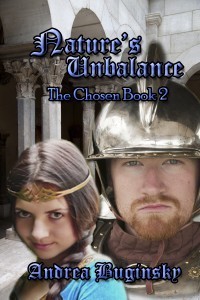Steven Ramirez's Blog: Glass Highway, page 43
December 21, 2012
The Friend I Found
Photo by macster7 via Creative Commons Like so many in America, I am grieving. As a Christian and father, I struggle with the reality of twenty-seven dead in Newtown. Since that day last week, a lot of words have been written and spoken. Words about innocence lost, loved ones taken too soon and hard questions still gone unanswered.
Like so many in America, I am grieving. As a Christian and father, I struggle with the reality of twenty-seven dead in Newtown. Since that day last week, a lot of words have been written and spoken. Words about innocence lost, loved ones taken too soon and hard questions still gone unanswered.
But there were also words about the courage of those teachers and administrators who tried to stop this terrible thing even as it was happening—who gathered children together and acted against everything to save them from Death. And many were saved.
So instead of commentary, I offer a simple poem. And I hope it will bring some small comfort during this Christmas season. God bless.
The Friend I Found
The friend I found
Brought me something,
Gave me an outland glimpse.
The time, the melody,
All of it showed me a new presence,
Something of which I’d often dreamed
Yet was unwilling to recall.
This person
Told me things,
Revealed hidden meanings and desires.
My soul, my conscience,
Everything was opened up to myself.
My being spinned rhythmically
And was made to balance.
Like a magical undoing
The friend I found became vulnerable and fragile
Before my eyes.
I wanted to let these tears long welled up within me
Trickle forth and wash my transgressions.
There and at that time
I felt warm and sleepy in the friend’s agelessness.
And now
Apart from everything, one with the friend,
I’ve come to believe that Chance is not my enemy.
I have been troubled by faith
But faith is in my own self, my own heart.
Rather than unbending it leaves me young and supple,
Able to shift as clouds do in a winter’s puff.
And as I glance over my shoulder at this friend I’ve found,
As I smile and take new pause,
There is no longer any need for fear or anger.
Link to this post!

December 14, 2012
Writing Big Scenes in a Novel
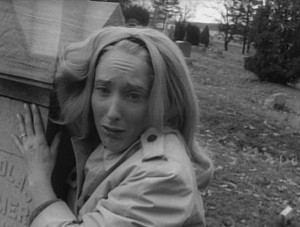 Normally I don’t like to talk about a work-in-progress. For me, it’s better to actually write than talk about the writing. Anyway, here’s the thing. I’ve been slogging through my new zombie novel—yes, that’s right, I am daring to be awesome—and I am at the point where things need to get bigger. I mean, really big. Like soldiers and guns against ravening armies of the Undead. My only problem? I don’t do big.
Normally I don’t like to talk about a work-in-progress. For me, it’s better to actually write than talk about the writing. Anyway, here’s the thing. I’ve been slogging through my new zombie novel—yes, that’s right, I am daring to be awesome—and I am at the point where things need to get bigger. I mean, really big. Like soldiers and guns against ravening armies of the Undead. My only problem? I don’t do big.
If you’ve read any of my work, you’ll know right away that I am the kind of writer who likes to focus on small, tense situations with very few characters. And over the years I’ve refined those particular chops. I am pretty comfortable coming up with painful dilemmas for these poor imaginary souls. And I always find a way to write my way out of them. Or else the characters die at the end, which is fine with me.
But now I’ve taken on a much bigger project, which is not to say I am writing about the zombie apocalypse. No, there are plenty of good books, movies and television shows covering that ground. I am particularly fond of ‘The Walking Dead‘ on AMC.
Small can be Big
My story has more in common with the original ‘Night of the Living Dead.’ You know how that one goes, right? First, there’s a single zombie (actually they are referred to as ghouls in the movie) stumbling around the cemetery where Johnny and Barbra have just laid a wreath at their father’s grave. Soon the gates of Hell open and now a bunch of twitchy strangers are trapped in a farmhouse, trying to find a way to stay alive while outside a horde of these ghouls is clawing its way in.
I watched George A. Romero’s excellent horror movie the other night and guess what. It still holds up. The writing is great. Not only is there the requisite gore but he gives us plenty of humor as well. Like when the field reporter, played by Bill “Chilly Billy” Cardille, interviews Sheriff McClelland and asks him, “Are they slow-moving, chief?” People pay good money for those kinds of laughs.
Romero does a great job of hinting at a bigger movie. Through a series of television reports, he lets us know that pretty much the entire eastern third of the United States has been overrun by ghouls. He tells us that top scientists are meeting with the President of the United States and that soon the National Guard could be deployed. But he never shows us those scenes—brilliant!
Now of course if you interviewed Mr. Romero, he’d probably smile affectionately like you were some kind of moron and say something like, “Of course, I didn’t show that. We had no money!” Fair enough.
Getting back to my book… Budget is irrelevant so I am free to write big scenes if I want to. The problem is, I really don’t know how without mimicking every apocalyptic disaster movie ever made. I refer to H.G. Wells’ War of the Worlds. In that book, the unnamed narrator carefully describes the Martian invasion. Compare that to Steven Spielberg’s version from 2005. Night and day, my friend. Night and day.
Time for Plan “B”
Because these kinds of set pieces don’t come naturally to me, I am forced to try another approach. I’ve decided that I will tell myself the story—in my head so that people don’t think I am a lunatic. In fact, I will describe scenes to myself as if I were watching a movie—but my movie.
Once I’ve gotten down the big strokes, I will then dissect the scenes and write about them piece by ear-splitting, gut-busting, brain-bleeding piece. With luck when I suture the parts together, I will have me one whopping good scene.
Will it work? I’m happy to report that I’ve begun to rewrite a few chapters this way and I believe it is in fact working. And to be clear, this is not big for big’s sake. The story requires it. At some point, the National Guard is deployed and given that they usually arrive packing lots of cool weapons, military vehicles and helicopters, things must get bigger. Which leads me to my next problem.
Research is Key
Recently I finished reading Stephen King’s excellent On Writing. Unlike James A. Michener, apparently Mr. King doesn’t do a ton of research before banging out a first draft. He is more interested in getting the story out of his system. I imagine the process is like pouring molten bronze into a mold—only there is no mold, just the hot metal holding itself together, somehow defying the laws of physics. Once that’s done and he is revising, he goes back and researches those things that need researching and makes the appropriate adjustments. I actually do some “pre-research,” then more after the first draft.
There’s a lot of research required to make the scenes in my book believable. Not to mention the idioms that people who are in the Army use. On that note, I recently met with a friend of mine, a retired police captain, who clued me in to how a local police department might handle a real outbreak. My next task is to interview someone from the National Guard to better understand how they actually bring order. Fun stuff.
So to recap:
Dream big scenes
Write them in small chunks then string them together
Apply research to correct and enhance the scenes
How does that sound to you? I’d love to hear how other writers handle this. And now for that excellent TV reportage where you’ll hear Sheriff McClelland provide the best description of a zombie ever.
Related articles
Night of the Living Dead (asheathersworldturns.wordpress.com)
How Steven Spielberg’s Cinematographer Got These Eleven Shots (vulture.com)
Courting Creepy: 13 crucial movies – for zombie lovers – at Halloween (or anytime.) By Jason. (theparanormalist.wordpress.com)

Link to this post!

December 7, 2012
Next Stop, Roy’s
Photo by junio via Creative Commons Around 1999, Qwest created a wonderful commercial in which a sweaty, haggard businessman wanders into Roy’s, the iconic motel off Route 66 in Amboy, California. So here he is in the brain-melting heat of the Mojave Desert and he asks what kind of in-room entertainment they have. The pretty, bored desk agent says, “All rooms have every movie ever made in every language. Day or night.” And the guy says incredulously, “How is that possible?”
Around 1999, Qwest created a wonderful commercial in which a sweaty, haggard businessman wanders into Roy’s, the iconic motel off Route 66 in Amboy, California. So here he is in the brain-melting heat of the Mojave Desert and he asks what kind of in-room entertainment they have. The pretty, bored desk agent says, “All rooms have every movie ever made in every language. Day or night.” And the guy says incredulously, “How is that possible?”
Well, this commercial was all about bandwidth, not content. But it was a great vision nevertheless. Every movie ever made? Any time you want? That’s what I want, people! Only I don’t want to rely on hard-to-find Blu-ray discs or crappy cable companies with their overpriced “packages” that allow me to watch ‘Man of the House’ as much as I want but won’t show the latest movies or, God forbid, foreign fare.
More specifically, I want to sit in front of my ginormous flat screen TV and watch a fully restored print of Federico Fellini’s ‘8 1/2’ dubbed into English. That’s right, English. And guess what. I’m willing to pay for the privilege. Oh, and while we’re at it, I also want the option of doing this on any device that can play video—whether I am at home or on the road. Now, that’s a vision.
The Problem with Subtitles
Let me tell you about ‘8 1/2’ and why I prefer the English version. This film has probably been written about more than any other and for good reason. It’s a masterpiece. Which is surprising when compared to the logline on IMDB: A harried movie director retreats into his memories and fantasies. How about this for ‘The Godfather’? A powerful, soft-spoken businessman tries to balance work and family life.
Released in 1963, ‘8 1/2’ won two Academy Awards for Best Foreign Language Film and Best Costume Design. It’s funny, modern and completely mesmerizing—in my opinion the best comedy ever made about the creative process.
At the time ‘8 1/2’ was made, many Italian films were shot using a wild track and had to be dubbed later. Some of these films featured international casts and each actor delivered their lines in their native language. Can you imagine what it was like to be on that set? Sergio Leone’s spaghetti westerns are a great example. In Fellini’s case, this allowed him to go back and rewrite the dialogue.
If I spoke fluent Italian I would have been perfectly content with the Criterion Collection’s beautifully restored version. But I don’t and I dislike subtitles. Speaking of subtitles, have you ever noticed that in Italian movies the actors make these impassioned page-long speeches and the subtitle reads something like, “No thanks, I already ate”?
Years ago I watched the English version of ‘8 1/2’ on public television. I read somewhere that Fellini had come to New York to personally direct the actors. Whether this is true or not, the result is outstanding. The dialogue is crazy, funny and fresh. And the actors were absolutely inspired.
The Big Content Library in the Sky
Getting back to the problem, why can’t I just turn on my screen of choice—credit card in hand—and watch this movie? I’m not even asking to own it. To be fair, some of the pieces are actually in place. Today I can stream movies from Netflix using an iPad or Xbox 360 or Roku, or any number of other devices. But I cannot do any of this easily and intuitively without cobbling together a patchwork of HDMI cables and power cords. And I most certainly can’t find every movie ever made. Where is the big content library in the sky? Ask the lawyers. Seriously.
When will this vision become reality? Probably never as far as content is concerned for a number of reasons. There are licensing considerations, music clearances, copyright issues, movies that haven’t been converted to digital, shrunken and rotting in aging film vaults, etc. As for technology, it certainly will get better. But it can’t be a kludge of devices and services. I shouldn’t have to care where the content comes from. Just deliver it to me and let me pay. Please, let me pay!
In the meantime I suppose I could book a room in Amboy and hope for the best. I sure hope I get Starwood points though. Oh, yeah, here’s the commercial:
Related articles
Fellini’s Fantastic TV Commercials (openculture.com)
Movie culture: The Dead, the Deader and the Deadest (blogs.suntimes.com)
What was Steve Jobs’s vision for the future of TV? (techhive.com)

Link to this post!

November 30, 2012
Your Call to Action
 Many years ago, long before the thought of writing a book had entered my head, I found myself owning a fledgling business. Not seeing any sales people or anyone else on my payroll, for that matter, I realized with a sudden sinking feeling that I would have to be the salesperson.
Many years ago, long before the thought of writing a book had entered my head, I found myself owning a fledgling business. Not seeing any sales people or anyone else on my payroll, for that matter, I realized with a sudden sinking feeling that I would have to be the salesperson.
I had never sold anything in my life. I had no clue how to sell anything and had never envisioned myself as a salesperson. My usual approach now when needing to learn a new trick is to read some articles on the Internet or buy some books from Amazon. Back then it was a visit to the library.
I read all the sales books I could find. Most of them seemed to be written by sales people who couldn’t sell hand warmers to Eskimos and hoped writing a book would enhance their financial situation. One book, however, stood out. Tom Hopkins’ book, Mastering the Art of Selling, detailed techniques and methods that I thought I could use. I’m paraphrasing here.
“Ask for the deal. Then shut up. First one to talk loses.”
Now mind you, Hopkins was selling real estate, not books. And I was selling software and consulting. No matter. A week or two later I found myself across the desk from a new potential client. His last consultant had disappointed him and he was skeptical about me too.
I asked for the deal. Not easy since I wasn’t completely sure of myself at that point. Then I just looked at him. And he stared back. It was a minute that felt like an hour. I desperately wanted to interrupt the silence by lowering the price. I almost did that, but kept reminding myself of Hopkins’ advice. I could see my prospect wrestling with the six thousand dollar decision. I sat there in painful silence. He finally stood up, stuck out his hand and said, “OK.”
So I won. That was a big deal for me at the time. And, I learned something important that day. I learned if you don’t ask you probably won’t get. And I learned if you talk too much you’ll probably ruin the deal. Eventually I learned many other important aspects of closing the deal.
I have employed Hopkins’ technique many times since that day. And I’ve found it transcends many kinds of sales. It apparently works for real estate and certainly worked well for me in consulting sales. But, it has also worked when asking my wife to empty the dishwasher or my son to mow the lawn.
And, there’s a lesson here in book sales as well.
There are three applicable parts to this lesson. The first is:
Ask for the Deal
You’re a writer. You make your living, as poor as it might be, by selling your words. So don’t be shy. In every blog, in every tweet and post and every query letter, you simply have to ask your reader to do something. That something might be to download a free excerpt, or buy your book or post a constructive comment. In every case make it easy for your reader. That means provide a link.
If offering a free excerpt or a discounted copy or your unremitting love isn’t enough, get creative. But just Tweeting, “Buy my book. It’s on Amazon.” isn’t really creative or compelling.
If you don’t ask, you probably won’t get. Make it easy.
Shut Up
Too much of a good thing might not be so good for you. An executive salesperson for whom I have great respect apparently learned how to use Tweetdeck. With it he could automatically send out Tweets every ten minutes all day long. It was obnoxious and I had to Unfollow him. Don’t overwhelm with quantity. Stagger them with quality, brilliance and ingenuity. There’s a fine line between consistent and compelling marketing and being over-the-top rude. You have to find that line.
First One to Talk Loses
It’s hard to stare down a client from the other side of the desk. It’s even harder over the Internet when you can’t even see the expression on your reader’s face. But, once you’ve given it your best shot, or your best few shots, move on. Find more readers. Write something else. Try a new tactic. If all else fails, try something easier, like nuclear physics or firefighting.
For more business, sales and publishing advice, follow me on Twitter at http://twitter.com/jwscott500
And, yes, that was my simple, shameless Call to Action.
Thanks for reading (it’s easier than writing).
Joel Scott
Teacher of Marketing for DeadBroke™ Writers and Director of HighRock Institute,
an Incubator for DeadBroke Entrepreneurs
Related articles
Killing the Man: Making A Living As an Artist Online [Feature] (makeuseof.com)
7 Reasons Your Dog is a Better Salesperson than You Are (customerthink.com)
The 20-Minute Exercise To Eradicate Negative Thinking (fastcompany.com)

Link to this post!

November 23, 2012
Everyone Deserves a Theme Song
Photo by Marcelo Henrique Zacarelli via Creative Commons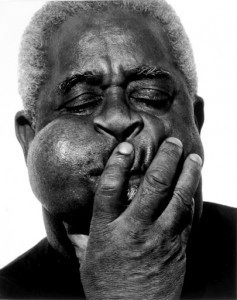 Eons ago I was a musician in a world where Starbucks, the iPhone and Gangnam Style did not exist. This was a time when people purchased vinyl records from such esteemed establishments as Wallichs Music City. Like other musicians I formed a band in high school that focused on Top 40, which was the de facto catalog for most musicians I knew. This is not to say we didn’t pay attention to hard rock. We just didn’t play it. I can recall listening to Iron Butterfly’s “In-A-Gadda-Da-Vida,” the Chambers Brothers’ “Time Has Come Today” and pretty much everything Jimi Hendrix ever released. Good times.
Eons ago I was a musician in a world where Starbucks, the iPhone and Gangnam Style did not exist. This was a time when people purchased vinyl records from such esteemed establishments as Wallichs Music City. Like other musicians I formed a band in high school that focused on Top 40, which was the de facto catalog for most musicians I knew. This is not to say we didn’t pay attention to hard rock. We just didn’t play it. I can recall listening to Iron Butterfly’s “In-A-Gadda-Da-Vida,” the Chambers Brothers’ “Time Has Come Today” and pretty much everything Jimi Hendrix ever released. Good times.
“The Sidewinder”
One day my father brought home a jazz single that sent me into orbit. It was Lee Morgan’s “The Sidewinder.” For me nothing was ever the same after that. I found an FM jazz station here in LA (KBCA) and became an instant fan of Jim Gosa and the legendary Chuck Niles (who later moved to KKJZ where he continued his stellar career until his death in 2004).
In college I formed another band—this time playing jazz piano—and am embarrassed to admit that I was epically horrible. My undying love of the musical form was eclipsed by my irritating lack of chops. That band didn’t last long but I did learn a lot from the generous musicians I played with, including a young tenor player from the Bay Area named David Murray.
Which brings me to now. As a writer I pay a lot of attention to structure in movies and television, observing that major characters all have theme songs—or at least musical cues. In the case of ‘Seinfeld,’ the distinctive bass guitar-and-synthesizer theme represents more the entire ensemble in my opinion. Whereas the ‘Curb Your Enthusiasm’ theme (Luciano Michelini’s “Frolic”) is all Larry David—again, my opinion. Of course, the best kind of theme is one that precedes you—think “Theme from ‘Jaws.’”
So I ask you: For the love of all that is bright and beautiful, why can’t the rest of us have a theme song?
I Want My Theme Song!
Think about it this way. If you saw yourself walking down the street in broad daylight, what theme song would they be playing (you know, that invisible orchestra from all those great movie musicals)? Okay, mine is Dizzy Gillespie’s “A Night in Tunisia.” I am particularly fond of the Jack Sheldon recording found on his Listen Up CD. (Lee Morgan’s “The Gigolo” was a close second but I was too frightened to delve into the psychology of that title.) So why this theme song for me? I’ve never even been to Tunisia and would have a hard time pointing it out on a map. The simple truth is, I don’t know—it just screams ME to me.
Okay, here’s one of the great things about good fiction. Characters don’t necessarily know everything about themselves even though they think they do. When you read a novel or a short story—or watch a movie, for that matter—certain truths about characters are often revealed by those around them much to the character’s own amazement. And this holds true for us too. Take that pivotal picnic scene in ‘Emma’ where Emma embarrasses Miss Bates in front of everyone by telling her what a boring chatterbox she is. This was a real revelation to that poor spinster and the remark devastated her. The scene is also important for what it reveals about Emma by the way.
So I don’t know why “A Night in Tunisia” works but I do know that it resonates with me, taking me to wonderfully magical places without unicorns every time I hear it. My wife Corinne once told me that she actually has two theme songs. Depending on her mood she alternates between the “Theme from Star Trek” (the warbly soprano version, mind you) and “Maiden Wine,” which was sung by Spock in the ‘Plato’s Stepchildren’ episode from the original show’s third season.
Try it yourself. Or better yet, try it with some friends. Ask them to guess your theme song based on what they know or think about you. I wouldn’t be too worried about what they come up with—unless of course it’s “Now That We’re Men” from ‘The SpongeBob SquarePants Movie.’ And now check out Dizzy…
Related articles
You Only Sing 23 Times: The James Bond Theme Song Dossier (tor.com)
Literary Soundtracks (girlsheartbooks.com)
25 most inspiring songs of all time (greetjetheerens.wordpress.com)

Link to this post!

November 16, 2012
Saying “No” to NaNoWriMo
Photo by Miroslav Nikolov via Creative Commons As I write this there are thousands of other writers around the world, madly slaving away at their novel in honor of NaNoWriMo. For those of you who are not in the writing trade, NaNoWriMo stands for National Novel Writing Month. Here is an excerpt from the “About” page on their site:
As I write this there are thousands of other writers around the world, madly slaving away at their novel in honor of NaNoWriMo. For those of you who are not in the writing trade, NaNoWriMo stands for National Novel Writing Month. Here is an excerpt from the “About” page on their site:
National Novel Writing Month is a fun, seat-of-your-pants approach to novel writing. Participants begin writing on November 1. The goal is to write a 50,000-word (approximately 175-page) novel by 11:59:59 PM on November 30.
Valuing enthusiasm and perseverance over painstaking craft, NaNoWriMo is a novel-writing program for everyone who has thought fleetingly about writing a novel but has been scared away by the time and effort involved.
So that’s fifty thousand words in thirty days or 1,666.666666666667 words per day. Yeehaw! Well, guess what. I’m not having it.
That’s right. I refuse to participate. Why? It’s not because I don’t respect anyone who has the discipline to write nearly seventeen hundred words a day for thirty days straight. And it’s not because it wouldn’t be fun to see if I could create a story from start to finish in that time. And it’s certainly not because I wouldn’t be able to boast in some future tense that I created my bestselling masterpiece in thirty days. No, my reason is much more prosaic. I don’t have time.
It’s All About Priorities
I actually considered participating in this year’s contest. I’m a member of several writers groups which give out daily encouragement to those foolhardy enough to attempt this Herculean task. But you see the thing is, I am into the second draft of my zombie novel and at seventy-five thousand words it really isn’t long enough to begin with, which is a never-ending source of agita. In addition I have committed to posting regularly on this blog and am doing my best to market my published works via Twitter and Facebook. On top of that I regularly offer my time to other writers for anything from marketing and social media advice to written critiques of their works in progress.
Not that I’m complaining! I love what I do.
Looking at the problem practically, however, I would essentially have to put everything on hold for thirty days in order to participate in this contest. But if I want my book ready for publishing in the spring—or let’s face it, summer— I simply can’t afford to take a month off.
What Happens on December 1st?
So let’s say I was crazy enough to take this on. I sweat blood, eat badly and don’t exercise for a month and on the last day I giddily type The End. What do I have to show for it? Before I answer that, let me just point out that not all writers approach the craft the same way. Some meditate for days, weeks or even months. Then in an insane burst of creative energy they pour everything out onto the blank page. Others outline till their ears bleed, then they write. Then there’s me.
I don’t outline. Never have, never will. Also I am a slow reader and a slow writer. I might be able to hit the seventeen hundred required words per day but—and again this is just me—what I will end up with is fifty thousand words of dreck on December 1st.
What Was the Goal Again?
This is all supposed to be in good fun. And I am all for fun but writing time is precious. Do I really want to spend so much of it on something that will most likely end up in a drawer as a collection of marginal ideas for other as yet unwritten books? I don’t think so.
Now take a look at the list of Published NaNoWriMo Novelists. Though it’s not spelled out I am assuming that these are the actual novels people wrote during the contest. And to them I say, “Congratulations! Well done!” It would be interesting though to interview some of these folks to learn how many revisions they had to make compared to novels written the old fashioned way.
So to all my writer friends out there having at it, good luck and Godspeed. I sincerely hope you end up with something truly magical. I will cheer you on and slap you on the back as you cross the finish line. As for me, I’m getting back to the hard work of revising what I hope is a novel that is good and scary. We’ll see how that turns out. I might even grow a moustache this month for Movember just so I can feel that I’ve participated in something.
One more thing. Check out my solution to seventeen hundred words a day.
Related articles
NaNoWriMo got me started but… (bcsirrom.wordpress.com)
NaNoWriMo Scares My Socks Off (daphneshadows.wordpress.com)
Thirty Days and Nights of Literary Abandon (thekenyonthrill.com)

Link to this post!

November 9, 2012
The Asylum—Happy Fifteenth Anniversary!
The author with David Latt, Paul Bales and David Rimawi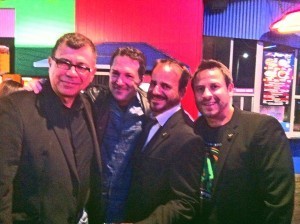 In the mid-nineties I was given the opportunity to write a screenplay for a low-budget feature film. The eventual title would be ‘Killers,’ directed by and produced by . Who knew that fifteen years later The Asylum would become a studio with an impressive catalog of more than one hundred films with titles like ‘Mega Piranha,’ ‘Mega Shark vs Crocosaurus’ and the inevitable ‘Mega Shark vs Giant Octopus’? Seriously, those are the titles. But wait, there’s more. They also make horror, drama and heartwarming family movies (be sure to check out the trailer for ‘Golden Winter’).
In the mid-nineties I was given the opportunity to write a screenplay for a low-budget feature film. The eventual title would be ‘Killers,’ directed by and produced by . Who knew that fifteen years later The Asylum would become a studio with an impressive catalog of more than one hundred films with titles like ‘Mega Piranha,’ ‘Mega Shark vs Crocosaurus’ and the inevitable ‘Mega Shark vs Giant Octopus’? Seriously, those are the titles. But wait, there’s more. They also make horror, drama and heartwarming family movies (be sure to check out the trailer for ‘Golden Winter’).
If I had to summarize The Asylum in one word it would be awesomely amazing—okay, two words. These guys have built a business model for creating low-budget movies that look fantastic, attracting name talent like , and , and getting the movies to market fast. Honestly I don’t know how they do it.
How It Began
When I started with these guys way back in the nineties, The Asylum was just getting ramped up. The Davids—Latt and Rimawi—definitely had a dream. And in a way I got to see that dream come together. Up until this time I had written a number of screenplays, none of which was ever produced. I had the good fortune to be introduced to these guys—Paul Bales would join the company later—through a mutual friend at New Line Cinema. He told me they were looking to shoot a feature film and they needed a screenwriter.
After meeting them I learned that there was no outline or even a hint of an idea—at least nothing they wanted to share. What they were looking for, they said, was to make a movie that had elements of horror and could be shot in one location. That was it.
The ‘Killers’ Story After a short time I presented them with a synopsis for a story about a group of motorcycle-riding twenty-somethings that was planning to purchase drugs from an outrageously repulsive dealer who can’t count. So they all meet up in a creepy building somewhere in LA. We soon learn that the drugs were in fact stolen from a local mobster.
After a short time I presented them with a synopsis for a story about a group of motorcycle-riding twenty-somethings that was planning to purchase drugs from an outrageously repulsive dealer who can’t count. So they all meet up in a creepy building somewhere in LA. We soon learn that the drugs were in fact stolen from a local mobster.
Before they can consummate the deal and get out, the mobster’s crew shows up, locks down the building and proceeds to pick off these star-crossed losers one by one. It’s essentially And Then There Were None with big guns, drugs and a twisted killer who thinks he’s having heavenly visions.
The story is seen through the eyes of Heather (), a rich girl who wants to be bad. Her nemesis is Nicky (), a good-looking psychopath who would rather kill than breathe. Unfortunately for Heather, Nicky discovers her after he shoots her boyfriend Ray, and he becomes obsessed.
As the story progresses Nicky ends up dispatching everyone—including his own crew—just so he can have Heather for himself. But in the course of the violence Heather actually transforms and instead of becoming just another victim, she does real damage of her own and ends up facing Nicky in a final showdown.
It’s been years since I’ve seen ‘Killers.’ I decided to watch it a while back. Actually we don’t watch movies in LA—we screen them. Well, I liked it. Maybe it was because of the memories it evoked or maybe because I’m still a sucker for horror mixed with slapstick.
I recall that the script went through seven drafts followed by more rewrites during shooting. There were times late at night listening to Jimi Hendrix’s “All Along the Watchtower” that I felt that I would never get it right. Which leads me to what I really wanted to talk about—how I was treated as a screenwriter.
I cannot say enough good things about the Davids. During the entire process they were respectful of my work and completely collaborative. This is not to say we didn’t argue. I can still remember some very lively coffee-fueled conversations at Aroma and Priscilla’s. But we did it with mutual respect and we always found a way to work things out.
These are the Good Guys
To promote ‘Killers,’ the Davids went on the road to horror and fantasy festivals both here and abroad where it seemed to do well. Eventually it came out on DVD and for a time could be found at Blockbuster alongside the ‘Chucky’ series. I’m hoping for the twenty-year anniversary rerelease on Blu-ray. We’ll see.
We have a saying in LA when something isn’t completely horrible or completely great—It is what it is. Could the writing have been better? Of course. But it was still worth doing. Happy anniversary, guys! Here’s to another fifteen years! Oh, and I’m really looking forward to ‘Sharknado.’
To see photos from The Asylum’s fifteenth anniversary party, go here.
Related articles
Attack Of The Mockbuster Movie: Hobbits, Zombies And 2-Headed Sharks (forbes.com)

Link to this post!

November 2, 2012
Seven Steps to Hell or How to Write Badly
Photo by Jonathan St. Mary via Creative Commons One of my all-time favorite jazz recordings is “Seven Steps to Heaven” by Victor Feldman and Miles Davis. I don’t know how they did it but those seven simple notes just take you away. The composition sings. That got me thinking about good writing and what makes it sing.
One of my all-time favorite jazz recordings is “Seven Steps to Heaven” by Victor Feldman and Miles Davis. I don’t know how they did it but those seven simple notes just take you away. The composition sings. That got me thinking about good writing and what makes it sing.
I began this shared journey way back in July with this post where I talked about wanting to get better as a writer. Of course anyone who is serious about the craft wants that. I thought I would follow up with another post about things I’ve seen over the last few months reading others’ works—specifically books published in the Kindle Store. My list is by no means comprehensive but the things I want to mention do make the difference between good and bad writing.
1. Don’t Research Things You Know Nothing About
There is nothing a reader hates more than coming across material that rings absolutely false. Recently I started reading a book that takes place in America, written by someone who is clearly not American. The author had no clue how Americans actually speak in everyday conversation, not to mention the fact that he was clueless when it comes to how law enforcement works in this country.
As I quietly gave up after around Chapter Five I wondered why the author didn’t simply set the story in his own country. It would have worked just as well since nothing about the plot was particularly American. Maybe I’ll get the chance to ask him some day.
2. Include Plenty of Backstory and Exposition
Many writers know not to do this but there are still plenty of titles out there that suffer from the author’s need to explain everything before getting to the present story. I think it comes from outlining. It’s almost as if the author wants to show us how much work went into researching their characters and setting. Honestly why must I know where the character went to middle school in Chapter One? Frankly that’s for the author to know internally and not for public consumption—unless it figures into the story somehow. You know, the killer turns out to be the guy who he was best friends with in middle school.
Here’s a good rule: If it happened in the past, leave it out.
3. Introduce Lots of Characters at the Beginning
I don’t know why it is but some authors seem to think that introducing lots of characters at the beginning of a book and giving them equal weight makes for good storytelling. It doesn’t—unless you’re Charles Dickens. And for the most part his books don’t begin that way. Characters are introduced as the story unfolds but we always know who we are following.
I read a story recently about people—unrelated to one another—all having been visited by a demon or a monster of some sort. For the first five or six chapters I had to wade through each character’s past experience with the demon, not really knowing who the main character was supposed to be.
To be honest I bailed without ever finding out. And not knowing didn’t keep me up at night either. For me what would have been better is to introduce a single character—maybe an investigator of the supernatural—who visits these people to learn about the demon. Maybe he has his own internal demons. That way I would clearly have someone to follow.
One of the easiest ways to tell the reader who they should be following is to write in the first person. If you’re not doing that, make sure to focus on a single character and tell us why we are interested in following him or her at this particular point in their lives. In other words, what problem are they trying to solve? Better yet, make the problem Life or Death. If you’d like to read a great example of how to do this, read A Spot of Bother by Mark Haddon.
4. Make Sure Your Protagonist Adheres to the Plot
You’ve just explained that your protagonist is terrified of heights, yet when someone suggests he go to the roof to retrieve a valuable piece of the puzzle, he happily goes. Why? Because he has to in order for you the author to continue with your story.
Readers hate that. We want people to behave in ways that make sense according to what you’ve previously described. How about this? The stranger wants him to go to the roof but he refuses. Later he is drugged and when he awakens he is on the roof. Utterly terrified he must find the clue and somehow make his way back down. There, isn’t that more satisfying? Of course it is.
5. Include Dialogue for Dialogue’s Sake
You’re a witty writer—oh, yes you are! Just look at all that clever dialogue. I have one question for you: Is this a book or a Noel Coward play? The only purpose for dialogue—and the same holds true for screenplays by the way—is to move the story forward or impart information necessary to move the story forward.
If it isn’t doing either of those things it should be cut. Period.
6. Pepper Your Prose with Plenty of Clichés
I’ve harped on this before but it’s worth repeating. Clichés are the sign of a lazy writer. They are the ugly cousins of the bad metaphor. How many times have you read phrases like these? At the end of the day. On steroids. Hell on earth. And so on. For more on this topic, take a look at this post by Ben Yagoda: “Clichés Are the Poster Child for Bad Writing.” Poster child is also a cliché but I think he was being ironic. At least I hope he was.
Keep in mind though that if your character speaks in clichés either through dialogue or narration, that’s fine. It’s a character trait. I would still try to keep these to a minimum, otherwise they become tiresome.
7. Add Lots of Gratuitous Sex Scenes
Okay, there is a rich history of literature that includes sex. If handled well it can be very effective. And I am not referring to erotica. That’s a special genre which I know nothing about. What I’m talking about are mainstream books where the characters engage in lots of meaningless, unprotected sex. Look. I’m not a prude. It’s just that sex scenes typically do not move the story forward.
Many R-rated movies suffer from the same illness, come to think of it. I mean seriously. What great truths about our two main characters are being revealed as they go at it like howler monkeys? Look at a classic like ‘Double Indemnity.’ Granted, at that time the Hays Code was in force so the studios couldn’t really show actors ripping each other’s clothes off. But how much better did the scene play when Phyllis shows up at Walter’s apartment and practically throws herself at him. Then the camera cuts away and later shows her primping in front of a mirror. And we just know they “did it.” We didn’t need to see the actual sex to know that she had succeeded in dragging Walter fully and completely into her demented plot to murder her husband. That’s good writing.
On the other hand there’s a terrific sex scene in ‘Summer of Sam.’ In fact it’s group sex. At this point in the movie like everyone else in New York, Vinny and Dionna are terrified over the Son of Sam killings. Somewhere along the way they are invited into Plato’s Retreat where they engage in all kinds of bad behavior. What the scene is telling us is that their marriage is at risk. They are losing themselves in all the craziness of that summer. And guess what—it works.
So there you have it. Seven things that add up to a lot of bad writing. Of course there are lots of other things writers do. What things have you read recently that irritate the hell out of you? I’d love to hear from you.
Related articles
Tips to Go Pro: Show More (shannondonnelly.com)
Ax Your Cliches: Why and How (writersinthestorm.wordpress.com)
Goldilocks and the Three Kinds of Dialogue (tracystaedter.com)

Link to this post!

October 26, 2012
Happy Halloween—Here’s Your Free Scare
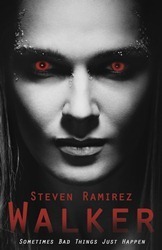 For weeks, I’ve been telling you about my new short story, Walker. You’ve seen those eyes and you’ve asked yourself, Can my constitution take it? Are there some nightmares I will never recover from? I wonder what’s for lunch. Okay, forget that last question—The Grilled Cheese Truck just pulled up across the street and I can smell bacon.
For weeks, I’ve been telling you about my new short story, Walker. You’ve seen those eyes and you’ve asked yourself, Can my constitution take it? Are there some nightmares I will never recover from? I wonder what’s for lunch. Okay, forget that last question—The Grilled Cheese Truck just pulled up across the street and I can smell bacon.
Have you ever been advised not to awaken someone when they are sleepwalking? Have you ever wondered why? Well, gather round, people, because Walker explains exactly what happens should that unfortunate situation occur. And trust me, it doesn’t end well. Take a look at the description as posted on Amazon:
What is the one thing—the only thing—you must remember when someone you love sleepwalks? Don’t wake them. Ever. John Walker knows this and has so far taken all the right precautions to protect his wife, Mary Kate. But sometimes no matter what you do, no matter how vigilant you are, things go wrong.
John is about to learn that evil is out there waiting for the right moment. And when it strikes, it hungers for more than Mary Kate. It wants their daughter, Lucy. But it’s not his fault—it’s not anyone’s fault.
Sometimes bad things just happen.
Did Someone Say “Free”?
That’s right. Walker is free for Halloween on October 30th and 31st. Whoo-hoo! All you need to do is toodle over the Kindle Store and pick up your copy. Why am I doing this? First, because it’s Halloween—der! And second, because, you know, I’m trying to give a vast portion of the eBook-reading public vicious nightmares. You’re welcome.
What’s that you say? You can’t wait for the thirtieth? Fine. Here’s a little something to tide you over. A soupçon of suffering, a dollop of despair. Oh for crying out loud, an excerpt, okay?
From Walker, a Short Story by Steven Ramirez
I dozed in the uncomfortable waiting-room chair as dawn broke. The continual parade of announcements and random conversations of doctors, nurses and patients didn’t seem to affect me, I was so tired. Fortunately I’d been able to drop Lucy, still asleep, at my sister’s so I could stay with Mary Kate while they ran all kinds of tests.
Someone touched my arm. I opened my eyes to find a young doctor standing there. He was maybe Indian or Pakistani.
“Mr. Walker? Your wife is doing fine,” he said.
“Can she come home?”
“Yes. A few more minutes.”
“What’s wrong with her?”
“Nothing serious. She must be suffering from a great deal of stress.”
“What about the vomiting? There was blood.”
“Her stomach lining is irritated. So, yes, there was some blood. We’ve given her something for it. She’ll be out in a few minutes.”
“How long you married?” a voice said next to me after the doctor had gone.
I turned to find a grizzled man in his seventies with one regular eye and a scarred cloudy blue eye. He smelled sour—like he had bathed in a vat of rancid pickle juice. His right hand was hidden under a newspaper. And on his left was a wedding ring. His appearance made me wonder what kind of wife lets her husband go out in public like that.
“Hope your wife’s okay,” he said when I didn’t answer his question.
“It’s fine. She sleepwalks.”
The man’s face froze and his good eye bored into me. Slowly he raised a liver-spotted hand and pointed a bent finger yellowed from years of smoking unfiltered cigarettes. “You didn’t wake her, didja?”
“What? No, I— There was a car coming. And there was this neighbor …”
“Shouldn’ta woke her.” He rubbed the back of his parched, lined neck and shook his head sadly.
All I wanted was to get Mary Kate and take her home. I hated the old man now and did not want to have this conversation. Then I heard myself ask why.
There you have it. I hope you get a chance to read Walker. And may all your dreams be scary. What? Still hungry for more? Check out this trailer from the new Ethan Hawke movie, ‘Sinister.’
Link to this post!

October 19, 2012
Writers, Let Fall TV Inspire You
Andrea Buginsky is a freelance writer and author. The Chosen was her first book, and was followed by My Open Heart, an autobiography about growing up with heart disease. Nature’s Unbalance is the second story in THE CHOSEN series. Andrea plans to write more in the series. She’s already done with the first draft of book 3 and has a concept for book 4. You can find Andrea on her website, Andi’s Realm. Her books are available at Amazon and Barnes & Noble. Remember to sign up for Andrea’s newsletter to stay up-to-date on all of her exciting events.
Fall TV is back, and that is a good thing for writers. Why? Because new episodes of our favorite television shows can give us fresh ideas for our own writing.
For some writers, ideas come easily, for others not so much. By catching up on our favorite shows, watching fresh episodes every week, we can delve into the storylines and the characters’ triumphs and dilemmas. As we watch the plot unfold and the characters react to it, we may think of ways we would have written the situation. I know I have done this a lot when I’m watching TV. And that’s where the ideas come from.
As you’re watching your shows and thinking of ways you would write the storylines, you can go ahead and jot these ideas down to use for your own characters in your stories. Say, for example, your favorite character just found out she was pregnant, but she has a medical condition and isn’t sure how to handle it. So, she tiptoes around it, not telling anyone, because she’s too scared to find out what might happen.
Now, there you are, sitting on your couch saying, “Dummy, talk to your doctor. You never know what he may say. You and your baby could be perfectly fine!” Bingo! A new story idea for you. You now have a character who is facing a medical crisis, and trying to determine the best way to handle it. So send him or her to the doctor, discuss all of the details, and begin to work out what’s going to happen. You can build several chapters on just this piece of the storyline alone!
You can repeat this same scenario with any type of show you watch: drama, comedy, action, even reality. Just make sure you’re adding your own style to it and not directly copying the storyline. That is a no-no!
So, enjoy the new fall TV season. Sit back, relax, yell at your favorite characters, and then go rewrite their storylines the way you want them to be. Have fun!
Related articles
Season Premier (writingsluts.wordpress.com)
New Shows to Watch This Fall (apartmentguide.com)
Cuppa and a Catch up – An Author Interview with….Andrea Buginsky (missuswolf.wordpress.com)

Link to this post!

Glass Highway
- Steven Ramirez's profile
- 176 followers



